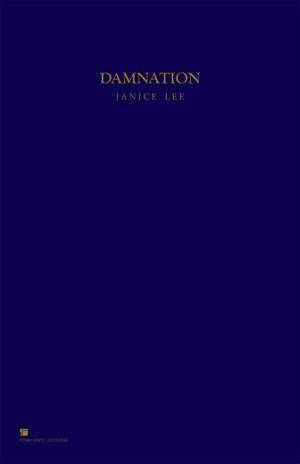Penny Ante Editions
168 pp, $14.95
Review by Amanda Montei
Janice Lee’s Damnation is composed of a series of responses to the films of Béla Tarr. Some ekphrastic, others seemingly commenting on the process of writing at hand, the short pieces that make up the text illustrate a world that is full of longing, sleeplessness, and the unsteady and uneven passage of time: “perhaps, spring is coming. Perhaps, spring is already here.” Lee’s work is one in a necessarily inconsistent line of texts that are trying to rethink how confessional and critical/theoretical modes might converge. I’m reminded of Kevin Killian’s Dargento Series, which similarly documents a kind of compulsive attempt to find emotional resonance in the films of Dario Argento. Like Killian, Lee is obviously searching out a linguistic counterpart for self, for writing, and for that affective gnawing that sometimes clutches us and drives us so deeply into cultural matter.
Without much awareness of Tarr’s films, what comes to the fore for me is instead “this kind of grim and dark and desperate kind of love” attributed throughout the text to the villagers, the lovers, the cows, the Lord himself. The book is also quit explicitly framed by the story of Lee’s obsession with Tarr’s work, which becomes inseparable from the micro-meditations that make up Lee’s text. As Jon Wagner writes in his incisive introduction, Lee’s collection of linked pieces develops “a conception of time washing over and awash in our efforts to represent and inhabit it.” So the book becomes neither autonomous from the films nor simply a commentary or translation of them, but rather an account of the temporality of obsession. This is what makes Lee’s book so revelatory—one cannot help but read her prose as always gestural, and yet if one is unfamiliar with the films, as I am, the gesture is one that points to the absence contained by the fullness of obsession, rather than to any filmic materiality. Lee isn’t reading Tarr’s work, but rather is inhabiting it, inhabiting a recursive experience with it, inhabiting lost time. Continue reading
![[PANK]](https://pankmagazine.com/wp-content/themes/pank/assets/images/pank-logo-large.png)

